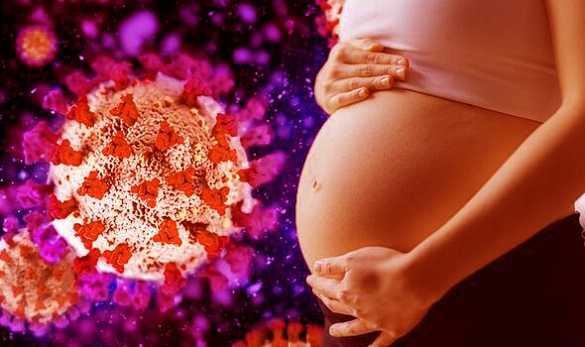Delta and Omicron Variants Disrupt Placental Cell Fusion and Behavior, Putting Pregnancies at Risk
Nikhil Prasad Fact checked by:Thailand Medical News Team Oct 08, 2025 4 months, 6 days, 1 hour, 51 minutes ago
Medical News: New research from the University of Geneva reveals how COVID-19 variants may endanger pregnancies
A groundbreaking study led by researchers from the Geneva Centre for Emerging Viral Diseases and the Faculty of Medicine at the University of Geneva has revealed that the SARS-CoV-2 Delta and Omicron variants can infect and alter key placental cells involved in early pregnancy. These findings shed new light on how COVID-19 may contribute to complications such as preeclampsia, miscarriage, and fetal growth issues during gestation.
 Delta and Omicron Variants Disrupt Placental Cell Fusion and Behavior, Putting Pregnancies at Risk
How the Placenta Protects the Baby
Delta and Omicron Variants Disrupt Placental Cell Fusion and Behavior, Putting Pregnancies at Risk
How the Placenta Protects the Baby
The placenta is the lifeline between a mother and her unborn baby. It delivers oxygen and nutrients while removing waste. Within it, special cells called trophoblasts fuse to form a protective layer known as the syncytiotrophoblast (STB), which prevents harmful substances and pathogens from reaching the fetus. Any disruption in this cell fusion process can interfere with placental function and, by extension, fetal health. According to this
Medical News report, the Swiss researchers wanted to understand whether new COVID-19 variants, particularly Delta and Omicron, could interfere with this delicate balance.
Studying the Impact of SARS-CoV-2 on Placental Cells
To investigate, the research team, which included scientists from the Geneva University Hospitals’ Departments of Medicine, Pediatrics, Gynecology, Obstetrics, and Pathology, isolated trophoblast cells from donated first-trimester placentas. These cells were then exposed to live Delta and Omicron (BA.1, BA.2, BA.5) variants in laboratory conditions. Advanced imaging and genetic testing confirmed that both early-stage cytotrophoblast (CTB) and syncytiotrophoblast (STB) cells could be infected by SARS-CoV-2, though the extent varied depending on the variant and donor.
The Delta variant showed a notably higher replication rate within these placental cells compared to Omicron. Importantly, Delta infection led to increased fusion between trophoblast cells—a process that, while essential for placental development, becomes harmful when excessive. Over-fusion may trigger abnormal syncytiotrophoblast turnover, potentially leading to inflammation, tissue damage, and pregnancy complications.
Evidence of Placental Damage in Real Pregnancies
The team didn’t stop at lab tests. They examined placental tissue from pregnant women who had contracted COVID-19 and suffered fetal loss during the early second trimester. These samples showed a marked increase in “syncytial knots”—clumps of dying placental tissue that form when the syncytiotrophoblast layer deteriorates faster than the body can replace it. Such findings mirror the lab data, confirming that SARS-CoV-2 infection—particularly with the Delta strain—accelerates placental cell turnover and damages the maternal-fetal barrier.
>Why Delta Was More Dangerous Than Omicron
The researchers found that Delta’s greater “fusogenicity”—its ability to make host cells merge—was tied to higher expression of TMPRSS2, a protein that helps the virus enter cells. This may explain why Delta was associated with more severe pregnancy outcomes compared to Omicron. Interestingly, Omicron showed lower replication efficiency and triggered weaker immune responses in the placental tissues, possibly reflecting its milder course in the general population.
What the Findings Mean for Expectant Mothers
This study emphasizes that COVID-19’s danger during pregnancy goes beyond general infection—it can directly disrupt placental structure and function, especially in early stages. The altered cell fusion and increased syncytial knot formation could contribute to the placental inflammation and oxygen deprivation seen in severe cases. The authors suggest that such disruptions may help explain why pregnant women infected during the Delta wave faced higher risks of miscarriage, stillbirth, and preeclampsia.
Conclusion
The Geneva team’s research underscores the placenta’s vulnerability to certain COVID-19 variants and highlights the need for continued monitoring of how evolving strains may impact maternal and fetal health. The findings also suggest that early gestation might be a particularly sensitive period for SARS-CoV-2-related complications, reinforcing the importance of vaccination and close medical follow-up for pregnant women exposed to the virus.
The study findings were published in the peer reviewed journal: Cell Death & Disease.
https://www.nature.com/articles/s41419-025-08016-x
For the latest COVID-19 News, keep on logging to Thailand Medical News.
Read Also:
https://www.thailandmedical.news/news/covid-19-found-to-cause-severe-placental-damage-in-pregnant-women
https://www.thailandmedical.news/news/covid-19-infection-during-pregnancy-alters-placental-genes-and-may-raise-risks-for-the-baby
https://www.thailandmedical.news/news/new-alarming-case-shows-omicron-and-newer-sars-cov-2-strains-can-still-damage-placenta-in-pregnant-women
